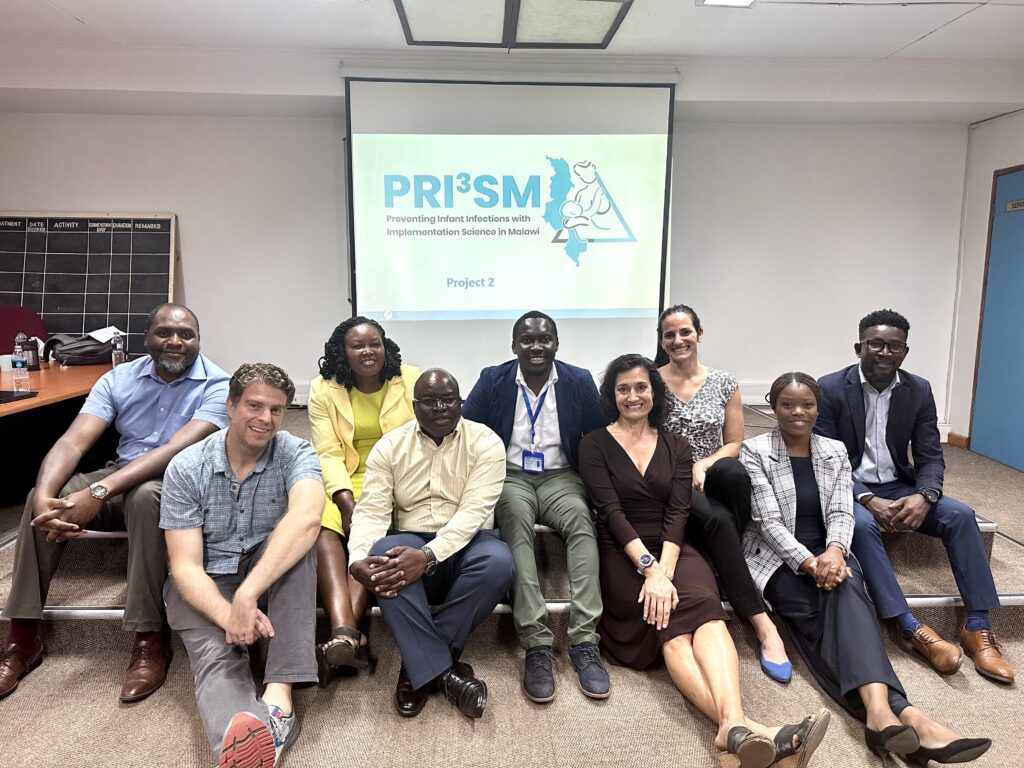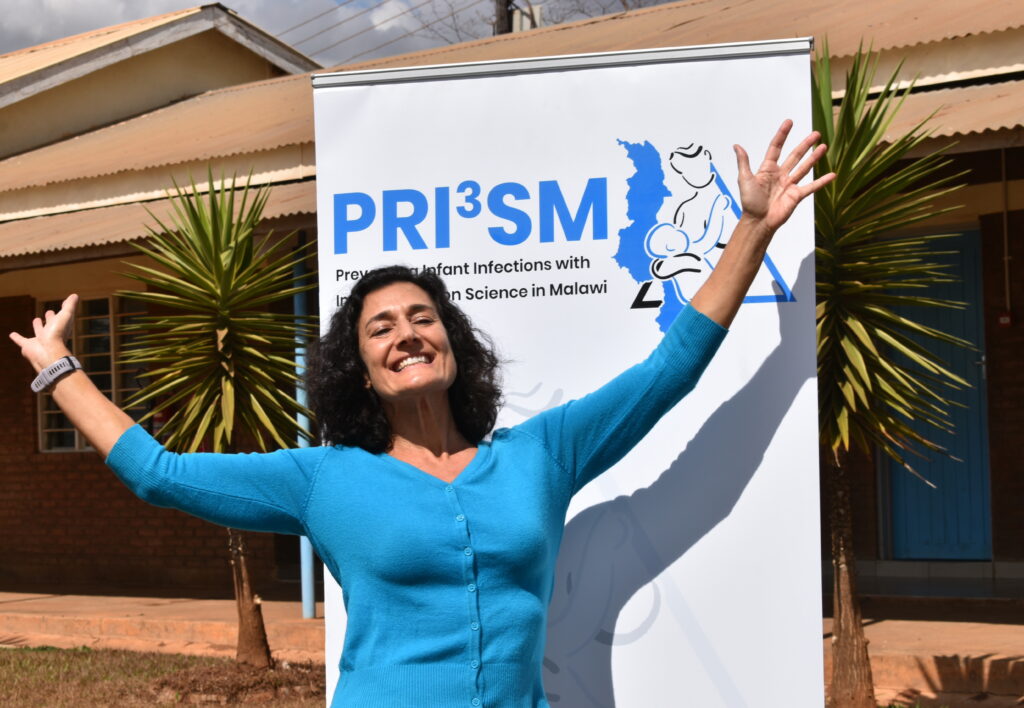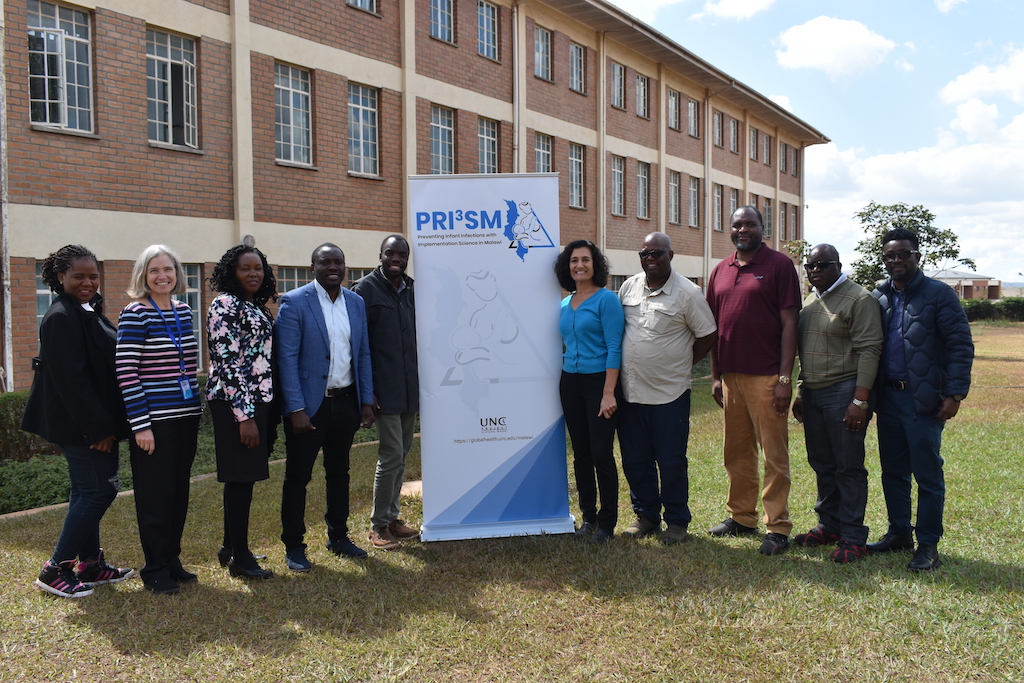Led by Mina Hosseinipour, MD, MPH, the NIH’s National Institute of Child Health and Human Development (NICHD), has funded the project “Preventing Infant Infections with Implementation Science in Malawi.” (PRI3SM). The program, in partnership with the Republic of Malawi’s Ministry of Health, comprises three studies to address gaps in prevention services, striving for elimination of vertical transmission of HIV, aligned with an integrated training framework that highlights ‘homegrown’ early investigators as leaders of the projects. It also demonstrates the best of capacity building, where a shift in health expertise and leadership has taken place.

UNC-Project Malawian faculty in leadership roles include Friday Saidi, MD (OB/GYN), Lameck Chinula, MD (OB/GYN), Tisungane Mvalo, MD (Pediatrics), Mitch Matoga, MBBS, PhD candidate (Implementation Science), Agatha Bula, PhD, MPH, RNM (Qualitative Research), and Maganizo Chagomerana, PhD (Data Analytics). Sarah Rutstein, MD, PhD, and Michael E. Herce, MD, MPH, MSCR, faculty who were previously ID fellows, round out the early career investigators. The team is supported by the strong leadership of Rose Nyirenda (PhD candidate), the director of the Malawi Ministry of Health’s Department of HIV, Sexually Transmitted Diseases and Hepatitis, and her team. The program is also supported by PEPFAR and its implementing partners, and complementary local stakeholders.

Hosseinipour, who has lived and worked in Malawi for the past 21 years describes the award as years in the making, based upon strong local partnerships and cross disciplinary expertise in clinical research, epidemiology, implementation and behavior science—all of which has nurtured the current generation of local health leaders. The program builds on accumulated research in vertical transmission of HIV and service, since 2002, initiated by the late Charlie van der Horst, MD, and subsequently advanced by Hosseinipour and others. The program also represents the best of capacity building and framework sharing, demonstrating how a shift in global health expertise and leadership can take place.
“I’m particularly proud of this accomplishment, especially with its engagement of young investigators from both the U.S. and Malawi,” Hosseinipour said. “Early investigators trained through UNC Project-Malawi are all now leading each of the projects and cores, matched with senior UNC-CH faculty including Brian Pence, PhD, Vivian Go, PhD, Irving Hoffman, PA, MPH, William Miller, MD, PhD, MPH, and Jess Edwards, PhD.”

Nyirenda says the program will serve as a model for other countries as they work to reach their 2030 health goals.
“Malawi has significantly expanded access to HIV services over the last two decades, having reduced new HIV infections by 86% between 1992 and 2002, as a leader in HIV science. On behalf of the Ministry of Health, we are excited about this opportunity to work closely with our local experts to address the reasons for vertical transmission of HIV in Malawi.”
PRI3SM Includes Three Related Studies
Project 1:

Led by Saidi, Project 1 focuses on PrEP in pregnancy, comparing the safety of long-acting injectable cabotegravir and oral tenofovir disoproxil fumarate (TDF) plus emtricitabine (FTC). This research builds on the recent success of the HPTN 084 study as effective PrEP but expands evaluation of adverse pregnancy outcomes and infant development through a surveillance registry of PrEP users, who become pregnant, and a prospective safety cohort of 621 mothers and their infants.
“This an important area to address as these new biomedical HIV prevention interventions are being introduced,” explained Saidi.
Project 2:
Led by Rutstein, Project 2 will test a combination of evidence-based strategies to improve effective use of biomedical HIV Prevention (pre-exposure prophylaxis or “PrEP”) among postpartum women, to reduce HIV acquisition and transmission during breastfeeding.

This type 1 hybrid cluster-randomized type will evaluate the effectiveness, acceptability, feasibility, and cost-effectiveness of a 4-component prevention package that is uniquely integrated into the well-attended “Expanded Programme on Immunization” (EPI) infant vaccination schedule. Besides integrating EPI and PrEP services, this package also includes male partner engagement and a community-facility linkage model to support adherence and retention form women who default from PrEP care.
“I am thrilled to be working with this team of investigators – building on decades of work in the EMTCT space and bringing together unique and complementary skillsets from U.S. and Malawi-based researchers,” Rutstein said. “Each project addresses a critical knowledge or implementation gap in the perinatal transmission cascade.”
Project 3:

Led by Herce, Project 3 will focus on women living with HIV and their infants, who have missed critical health services, such as maternal refills of antiretroviral therapy, maternal viral load testing, or infant HIV testing, all of which may be associated with higher risk of infant infection. To ensure these women and infants receive the HIV services they need, Project 3 will rigorously evaluate a package of evidence-based interventions, including point-of-care maternal viral load and early infant diagnosis testing, delivered in the community to reach these high-risk mother-infant pairs before adverse HIV outcomes occur.
“Malawi has been a global leader in work to eliminate mother-to-child transmission of HIV, with the first demonstration of test and treat for HIV in pregnant and breastfeeding women, and several landmark studies that have given us the right tools to fight HIV,” Herce explained. “This remarkable PRI3SM program offers the unique opportunity to study the delivery of these tools in combination in ‘real world’ settings to improve maternal health and get us closer to ending pediatric HIV in Malawi and the region.”

Supported By Three Cores
The three studies will be supported by the UNC Project Malawi Administrative Core, the Implementation Science Core, and the Data Science and Analytical Core. These cores support the projects and broader goals of expanding data science and implementation science knowledge.
Administrative Core:

Led by Hosseinipour and Chinula, the “Administrative Core” will coordinate and manage the administration of each of the research projects and cores, including managing relationships with the Ministry of Health, PEPFAR, Implementing Partners, and other research organizations. Hoffman, in his role as the International Director of the UNC Project, provides the administrative link to the Institute for Global Health and Infectious Diseases where he is the Director of International Operations.
“This award will help us support the efforts the Malawi Ministry of Health are putting in place to further reduce perinatal transmission of HIV, and generate more data for evidence-based interventions,” explained Chinula. “We are excited, once again, to have another platform that will allow us to work with key stakeholders in Malawi.”
The Implementation Science Core:

Led by Matoga, the “Implementation Science Core” will support all projects by promoting common approaches to the application of implementation science frameworks and strategies, and standardized assessment of implementation outcomes through shared tools and measures. Pence and Go will provide senior resource support to the Implementation Science Core.
“Without implementation of evidence-based innovations that are effective, acceptable, appropriate, feasible and cost-effective, it is impossible to eliminate vertical transmission of HIV,” said Matoga. “And innovations will not be impactful if they are not implemented well. Our goal is to ensure that the right innovations are selected and implemented by using appropriate implementation science methods, tools and frameworks. We aim to provide synergistic tool kits across the PRISM protocols to maintain high data quality and promote replicability. The implementation science core has experts in implementation science methods, qualitative research methods, mixed methods research, epidemiology, and mainstream implementation science.”
The Data Science and Analytical Core:
Led by Chagomerana, the “Data Science and Analytical Core” will support data use across the project, data analysis, including robust analytic methods for handling missing data, and cross-protocol modeling of overall impact. Chagomerana will be supported by Miller and Edwards.

“Achieving elimination of vertical transmission of HIV will depend on successful collaboration of scientists and practitioners from diverse fields for accurate outcome measurements and valid inference of research,” Chagomerana explained. “The Data Science and Analytical Core will bring together experts in analytical disciplines especially biostatistics, data management, data science, and epidemiology.
“Our goal is to ensure that synergies across the projects are realized by collaborating with the investigators in data management systems development, data management activities, and analytical aspects of the research projects from design to dissemination. Through its activities, the core will strive to develop capacity among Malawian junior investigators to produce and manage high quality data for evaluating perinatal HIV transmission, ART uptake and adherence, and PrEP uptake and adherence.”
Hosseinipour says PRI3SM has the potential to not only eliminate pediatric infection in Malawi, but provide a successful model for other countries to follow.
“While we have Malawian leaders of this project, we believe we can further enhance training and capacity building by linking our activities to our ongoing Fogarty funded training program, the Malawi HIV Implementation Research Scientist Program (MHIRST),” said Hosseinipour. “We also expect to identify master’s and PhD candidates from the MHIRST program to develop their dissertations alongside our team.”
Activities are rapidly ramping up, and studies are expected to begin in early 2024.
About UNC Project Malawi
UNC Project Malawi began as a collaboration with the Malawi Ministry of Health with the design of clinical management guidelines for HIV and STDs, founded by Myron Cohen and Irving Hoffman in 1990. This partnership was institutionalized in 1999 when UNC Malawi activities were consolidated into a center of excellence for HIV/STD research, patient care and capacity building, on the campus of Kamuzu Central Hospital, a 1,000-bed, public tertiary care hospital operated by the Ministry of Health. Today, operating through the Institute for Global Health & Infectious Diseases, UNC Project Malawi has 320 employees who conduct independent research and care for patients, with clinical registries in pediatrics, cancer, trauma, STI and sickle cell. Both Malawi and U.S. trainees benefit from years of capacity building and sustained research and scholarship.
